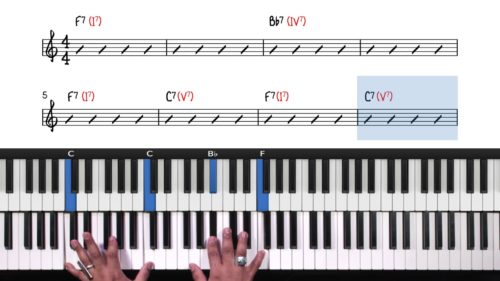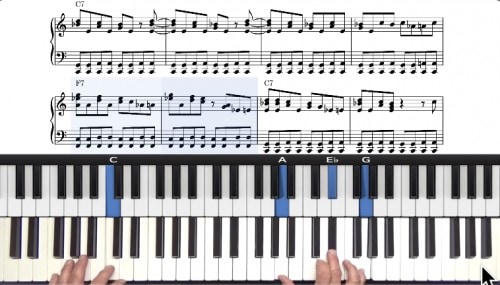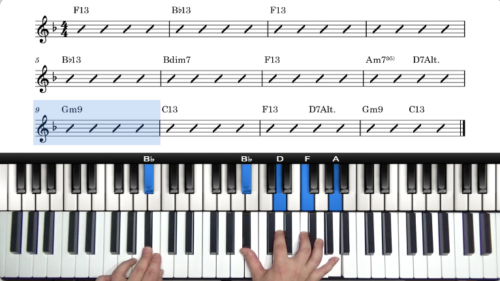Solo Blues vs Playing In Band
In this lesson we explore the differences when playing the 12 bar blues solo piano, and when accompanying a singer or playing with a band.
It’s important to understand your role in each of these situations so that you can play effective solo piano and also interact and support other musicians when playing in an ensemble setting.
Considerations When Playing With A Bass Player
It’s important to ‘stay out of the way’ of the bass player which means not to occupy the same sonic range of the piano. This can be achieved by playing omitting the root from our voicings and playing in the central range of the piano.
Rootless voicings typically contain the essential chord tones (3 and 7) and also chord extensions such as 9s, 11s, and 13s, and chord alterations which include the b9, #9, #11, and #5/b13
Considerations When Playing With A Drummer
If you are playing swing music and a drummer is present, the drummer’s comping rhythms will be similar to the piano player’s rhythmic stabs within the chord changes.
You are both occupying the same rhythmic territory and so leave space for the drummer to comping and try to fill in the gaps that are left.
Considerations When Playing With A Horn Player
If you are playing with both a singer and a horn player, the horn player will likely be filling in the space left by the singer. In this case we must leave space for the horn player to play the fills or horn lines.
Imitating A Full Band In Solo Playing
Now that we have isolated each of the components of the band and the role that they play, we can use this information to inform our own solo piano performances.
When playing solo piano try to imitate the role of each instrument. We can add subtle bass lines in our left hand, rhythmic comping in the centre of the piano, and melodic lines and motifs in the middle and higher registers.
Practice Tips
-
Be flexible with your voicing and rhythmic styles to work effectively with bass players, drummers, and soloists.
-
Always listen to the other band members and make sure that your piano playing contributes and not detracts from the performance.
- When playing solo piano, you are the band and you are responsible for all of these roles: the time, the chords, and the fills.







This was very useful knowledge.